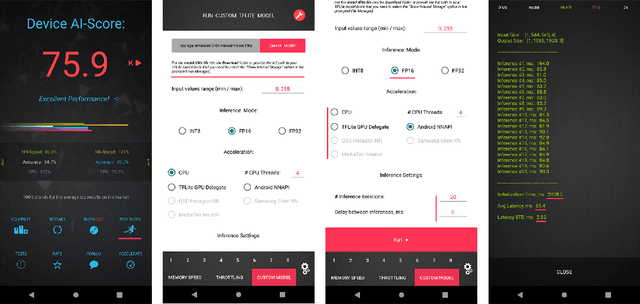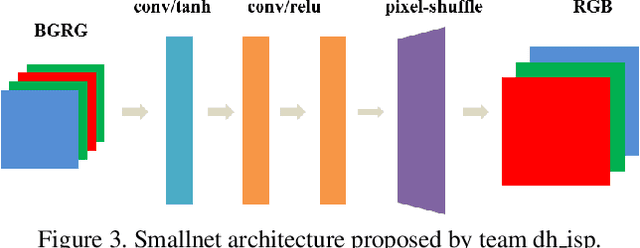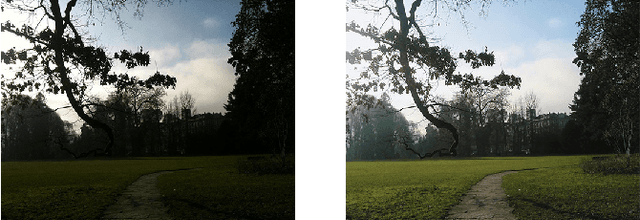Etienne de Stoutz
Learned Smartphone ISP on Mobile NPUs with Deep Learning, Mobile AI 2021 Challenge: Report
May 17, 2021



Abstract:As the quality of mobile cameras starts to play a crucial role in modern smartphones, more and more attention is now being paid to ISP algorithms used to improve various perceptual aspects of mobile photos. In this Mobile AI challenge, the target was to develop an end-to-end deep learning-based image signal processing (ISP) pipeline that can replace classical hand-crafted ISPs and achieve nearly real-time performance on smartphone NPUs. For this, the participants were provided with a novel learned ISP dataset consisting of RAW-RGB image pairs captured with the Sony IMX586 Quad Bayer mobile sensor and a professional 102-megapixel medium format camera. The runtime of all models was evaluated on the MediaTek Dimensity 1000+ platform with a dedicated AI processing unit capable of accelerating both floating-point and quantized neural networks. The proposed solutions are fully compatible with the above NPU and are capable of processing Full HD photos under 60-100 milliseconds while achieving high fidelity results. A detailed description of all models developed in this challenge is provided in this paper.
Fast Perceptual Image Enhancement
Dec 31, 2018



Abstract:The vast majority of photos taken today are by mobile phones. While their quality is rapidly growing, due to physical limitations and cost constraints, mobile phone cameras struggle to compare in quality with DSLR cameras. This motivates us to computationally enhance these images. We extend upon the results of Ignatov et al., where they are able to translate images from compact mobile cameras into images with comparable quality to high-resolution photos taken by DSLR cameras. However, the neural models employed require large amounts of computational resources and are not lightweight enough to run on mobile devices. We build upon the prior work and explore different network architectures targeting an increase in image quality and speed. With an efficient network architecture which does most of its processing in a lower spatial resolution, we achieve a significantly higher mean opinion score (MOS) than the baseline while speeding up the computation by 6.3 times on a consumer-grade CPU. This suggests a promising direction for neural-network-based photo enhancement using the phone hardware of the future.
PIRM Challenge on Perceptual Image Enhancement on Smartphones: Report
Oct 03, 2018



Abstract:This paper reviews the first challenge on efficient perceptual image enhancement with the focus on deploying deep learning models on smartphones. The challenge consisted of two tracks. In the first one, participants were solving the classical image super-resolution problem with a bicubic downscaling factor of 4. The second track was aimed at real-world photo enhancement, and the goal was to map low-quality photos from the iPhone 3GS device to the same photos captured with a DSLR camera. The target metric used in this challenge combined the runtime, PSNR scores and solutions' perceptual results measured in the user study. To ensure the efficiency of the submitted models, we additionally measured their runtime and memory requirements on Android smartphones. The proposed solutions significantly improved baseline results defining the state-of-the-art for image enhancement on smartphones.
 Add to Chrome
Add to Chrome Add to Firefox
Add to Firefox Add to Edge
Add to Edge